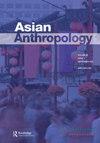Special issue: Exploring rural Japan as heterotopia
Q2 Social Sciences
引用次数: 0
Abstract
This set of papers, by authors from Japan, Europe, the US and Canada, originated from a panel entitled “Heterotopia in Post-Growth Rural Japan: Negotiating Difference in Local Communities” at the Annual Meeting of the American Anthropological Association in San Jose, California, 2018. All contributions draw on long-term ethnographic fieldwork. We believe that the grounded perspectives salient in all papers tie in well with the concept of heterotopia, as the research tool of ethnography highlights the multilayered nature of places and social relations across times and spaces. The original panel organizers were Stephanie Assmann and Susanne Klien. But as Stephanie shifted to a new university position, Paul Hansen, who was unable to join the original panel due to being on another, stepped in as co-editor and contributor. We remain indebted and thankful for Stephanie’s input and continued camaraderie. We would also like to express our thanks to Kato Fumitoshi (Keio University), who was an outstanding panel discussant at the AAA and helped shape the trajectory of this project. Before delving into the papers included in this special issue, some obvious questions emerge. What is heterotopia? For those readers who are familiar with this pervasive but elusive concept, why is it used as a provocation or conceptual scaffolding herein? And why focus specifically on rural Japan? These important questions we will address in this short introduction before offering an outline of the contributions.特刊:探索日本农村作为异托邦
这组论文由来自日本、欧洲、美国和加拿大的作者撰写,源于2018年在加利福尼亚州圣何塞举行的美国人类学协会年会上题为“增长后日本农村的异质性:谈判当地社区的差异”的小组讨论。所有的贡献都来自于长期的民族志实地调查。我们认为,所有论文中突出的有根据的视角与异托邦的概念非常吻合,因为民族志的研究工具突出了地方和跨时代、跨空间的社会关系的多层次性。最初的小组组织者是Stephanie Assmann和Susanne Klien。但随着斯蒂芬妮转到一个新的大学职位,保罗·汉森(Paul Hansen)担任了联合编辑和撰稿人。我们仍然感谢Stephanie的投入和持续的友情。我们还要感谢Kato Fumitoshi(庆应义塾大学),他是AAA的杰出小组讨论者,帮助塑造了该项目的发展轨迹。在深入研究本期特刊中的论文之前,会出现一些明显的问题。什么是异位?对于那些熟悉这个普遍但难以捉摸的概念的读者来说,为什么它会被用作挑衅或概念脚手架?为什么要特别关注日本农村?我们将在简短的介绍中讨论这些重要问题,然后概述贡献。
本文章由计算机程序翻译,如有差异,请以英文原文为准。
求助全文
约1分钟内获得全文
求助全文
来源期刊

Asian anthropology
Social Sciences-Anthropology
CiteScore
1.60
自引率
0.00%
发文量
25
期刊介绍:
Asian Anthropology seeks to bring interesting and exciting new anthropological research on Asia to a global audience. Until recently, anthropologists writing on a range of Asian topics in English but seeking a global audience have had to depend largely on Western-based journals to publish their works. Given the increasing number of indigenous anthropologists and anthropologists based in Asia, as well as the increasing interest in Asia among anthropologists everywhere, it is important to have an anthropology journal that is refereed on a global basis but that is editorially Asian-based. Asian Anthropology is editorially based in Hong Kong, Taiwan, and Japan, but welcomes contributions from anthropologists and anthropology-related scholars throughout the world with an interest in Asia, especially East Asia as well as Southeast and South Asia. While the language of the journal is English, we also seek original works translated into English, which will facilitate greater participation and scholarly exchange. The journal will provide a forum for anthropologists working on Asia, in the broadest sense of the term "Asia". We seek your general support through submissions, subscriptions, and comments.
 求助内容:
求助内容: 应助结果提醒方式:
应助结果提醒方式:


